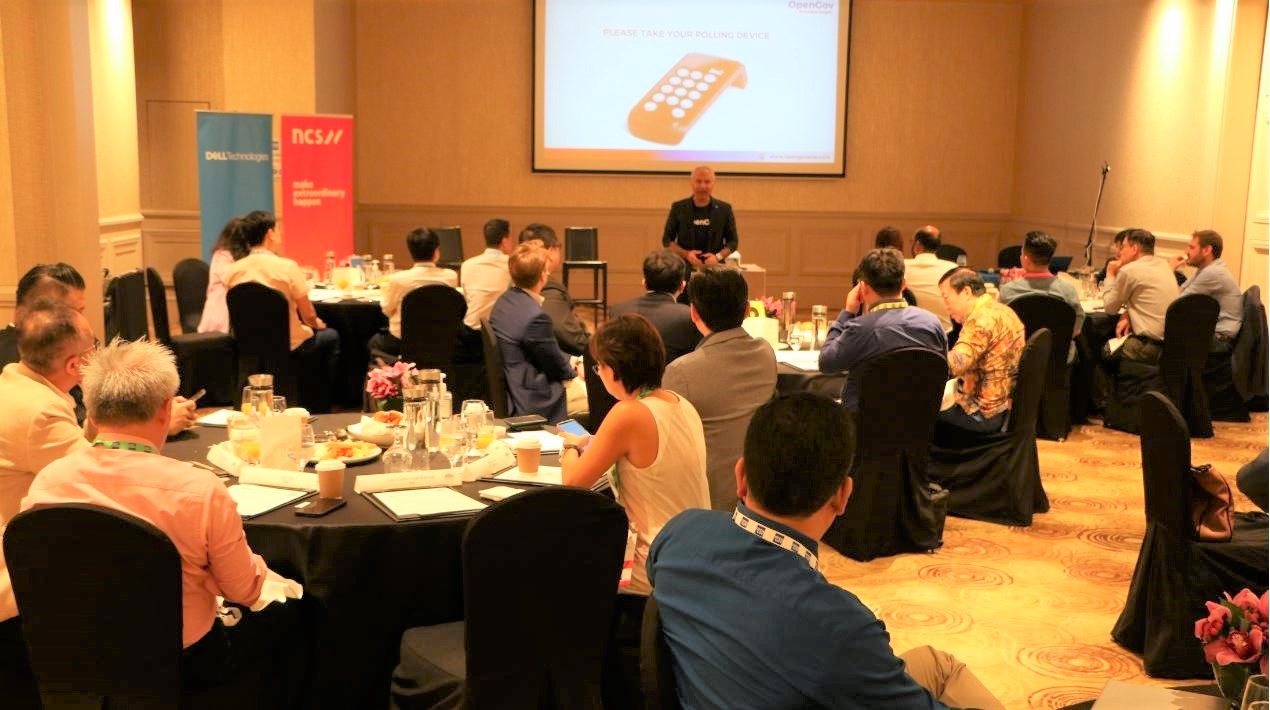
Many financial institutions invested in digital platforms and solutions well before 2020 to respond quickly to VUCA or the volatility, uncertainty, complexity, and ambiguity environment.
The digital transition was justified in retrospect as companies try to deal with the ongoing COVID-19 crisis, corporate leaders should think about a few key things and take steps to not only respond to severe business shocks but also reshape their businesses and plan for their recovery.
Global companies must be predictive and proactive in their decision-making to preserve business continuity and build enterprise resilience as businesses should simply turn up their speed and agility when a crisis arises so they can seize the chance.
Companies must also show agility in a crisis so that they can shift to similar or completely different product domains. Hence, the demonstration of speed has led to hopes for faster changes in the future and a new way of looking at past efforts, which are now seen as lacking a real driver for speed.
Optimised and creative digital user experiences are business necessities in today’s financial services firms, but they can’t be made with outdated technologies, organisational techniques, and legacy infrastructure.
Because of these changes, there was a “shift to digital,” which mostly confirmed what institutions already knew about the future of customer engagement. Instead, the most useful insight is probably how flexible the industry has been and how that has changed the way executives think about past and future transformation strategies.
With this, AIOps platforms are essential to modern digital infrastructure. They improve IT operations by using analytics and machine learning (ML) to make sure services are always secure, reliable, and high performing. AIOps takes data from different IT operations tools and uses AI/ML analytics to automatically find and fix problems as they happen.
The OpenGov Breakfast Insight on 1 September 2022 offered the latest information to top-level financial services industry leaders in Singapore on successful AIOps in the financial sector.
Leveraging AIOps in the Finance Industry

Kicking off the session, Mohit Sagar, CEO & Editor-in-Chief, acknowledges that the Platforms for AI for IT Operations (AIOps) are important parts of modern digital infrastructure in the FSI.
Mohit believes that an organisation would gain a competitive advantage with a platform that supports operational intelligence and automatic services with the ability to deliver innovative AI, ML and automation. “When data provide genuine insights, you can take action that can make people understand and support.”
In the current VUCA (volatility, uncertain, complex and ambiguous) environment, Mohit explains, there are intrinsic characteristics that make a situation or condition difficult to analyse, respond to, or plan for. Understanding how to mitigate these characteristics can significantly enhance a leader’s strategic abilities and result in improved outcomes.
In this scenario, when correctly implemented, actionable intelligence provides a company with a strategic advantage over its competitors.
The term “actionable” indicates that the information is such that it offers the potential to be acted on – and should be used to act. When an organisation desires to act based on past experiences or behaviours, actionable intelligence comes into play. When organisations improve their market position because of actionable intelligence analysis, they gain competitive intelligence.
Actionable intelligence is frequently gathered in the context of big data, where there are enormous amounts of information and this information is used to make extremely precise decisions. Whereas actionable intelligence aids in future planning for a company and can boost market performance.
Citing Singapore as an example, Mohit observes that it has established itself as a centre for vaccine production and distribution because of the pandemic. It used the black swan event to reconsider how it can operate more efficiently. Singapore adapted to the changes brought about by COVID-19 TO develop into a smarter nation.
Eventually, many financial institutions are expanding their online offerings to strengthen their digital presence and meet their customers’ growing reliance on online banking. As a result, AIOps are essential for remaining competitive in today’s finance industry.
AIOps technologies help to prevent customer-impacting downtime by quickly locating and identifying problems within a system and determining their root cause. “AIOps can help protect against cybercrime and its possible disastrous financial effects on businesses, such as falling stock prices, damage to their reputations, and legal action, on top of the known financial losses.”
As more people get used to virtual experiences and the flexibility of always-on digital solutions, more people will use digital banking. But financial institutions must get ready for this change while also dealing with rising cybersecurity risks and higher customer expectations for uptime and cutting-edge technology.
AIOps are necessary to solve these problems and gain a competitive edge in the highly competitive financial industry.
Leading Successful AIOps for Financial Services

To deal with the huge growth in monitoring, data, complexity and user expectations, IT teams need to set up an AIOps platform that allows service-driven, autonomous remediation, according to Ravi Bedi, Head & Practice Lead, AI-Led Solutions, NEXT Solutions, NCS Group.
As the financial services industry moves toward digitalisation, it needs to be able to provide more business-critical services in hybrid environments. Ravi feels that IT operations are the most important part of any business in the modern world. Every year, new technologies, tools, and ways of doing things come out, which makes operations more complicated. Thus, “the IT team should be more collaborative.”
IT operations that rely heavily on cloud infrastructure need to deploy agile development methods. To keep up with the changing trends, IT operations need to scale up to meet the demand and keep innovating for better service.
On the other hand, cloud orchestration organises, manages and provides cloud components to a host of users. It helps organisations manage their IT operations in a cloud-heavy environment. With this, finding the right cloud strategy can transform and boost an enterprise.
In the current financial services industry, the quality of end-to-end digital experiences is what gives organisations a competitive edge and distinguishes great leaders from others. However, as IT systems become more complex, dynamic, diverse and hybrid, it becomes increasingly difficult for IT operations teams to meet deliverables, objectives, and mandates.
Legacy systems are frequently found at the core of traditional enterprise IT operations. This is primarily due to end-users’ extreme level of comfort with the current system, despite its obvious flaws.
Consequently, the cloud-first strategy is the optimal solution. The agility provided by modern, cloud-based IT operations management tools enables rapid organisation expansion. Hence, a cloud-based IT operations model enhances the security of an organisation’s IT infrastructure. In lieu of risking damage to the production environment, they can configure virtual machines to deploy applications.
With this, IT professionals are empowered to understand tools thoroughly and to detect and resolve problems before they occur. In addition to choosing the appropriate technology, it’s crucial to make sure that the company culture is in line with the new course and that the teams can support the new digital strategy.
A company’s culture is created by the individuals hired, the procedures used and the values upheld. These cultural factors interact with the modifications brought about by digital transformation. “Your digital transformation will suffer if these factors don’t change to accommodate impending change,” Ravi is firmly convinced.
A company may see slow user adoption and productivity loss if its digital transformation is not in line with its culture. “Therefore, whenever your organisational culture runs counter to the mindset of digital transformation or your specific project objectives, we advise changing it.”
Powering Service Level and Operational Efficiency Breakthroughs in Financial Services using AIOps

According to Pravat Sutar, Vice President – Data Architect, Great Eastern Singapore, new technologies like cloud computing, virtualisation, and the Internet of Things (IoT) present new challenges for IT organisations.
“As these organisations expand their IT infrastructure, they must also modify their operations management processes to meet the demands of the business for performance, security, and cost control,” Pravat opines.
Most IT infrastructures have grown organically, and as a result, there are frequently significant gaps between various technologies and systems. In IT operations management, AI has a clear advantage as AIOps use artificial intelligence to streamline IT operations and speed up, automate, and solve issues in challenging modern-day IT environments.
Moreover, by mitigating risks, increasing operational efficiency and accelerating growth and innovation, AI enables businesses to achieve profitable digital transformations.
Pravat stated that AIOps in financial services could lead to identifying and preventing fraud, cost reduction and better customer service. “Indeed! AI plays a vital role in the digital economy.”
AIOps can identify a data breach in a matter of seconds, in real-time, as opposed to traditional technology and manual processes, which can take up to 6 months. AI can also lessen the possibility of false positives in traditional fraud detection techniques. It can track spending and deposit patterns over time, notify staff of anomalies, and halt payments in their tracks.
In addition, the combination of machine learning and data analytics drastically reduced errors and enhanced the quality of the financial services provided. The predictive analytics of AIOps provide early warnings through alerts that diagnose problems; reduce downtime, and save businesses thousands of dollars.
AIOps can also supplement or even replace several existing IT operations processes. AIOps builds upon Robotic Process Automation (RPA) and Automation of IT processes (ITPA) to automate rule-based and repetitive tasks by combining big data with AI and machine learning.
Pravat thinks that customers’ daily use of digital channels has a significant impact on the quality of the experience they have in terms of delivering superior customer service. Bank customers need to be able to see transactions in real-time. Fraud departments need both real-time access to transaction data to build strong predictive models and proactive ways to spot outliers that could be signs of illegal activity.
Stop downtime that affects customers by quickly finding and identifying problems in a system and figuring out their root causes. As a result, service assurance gets better and the mean time to remediation, or MTTR, gets shorter. This makes customers happy.
Pravat believes that small and medium-sized businesses (SMEs) in Singapore are switching to AI-based IT operation tools to improve service quality and meet changing customer needs in an agile way. So, the growing number of deployments and shorter development cycles have forced SMEs to use both DevOps and AIOps to stay competitive in the market.
Closing Remarks
 According to Phillip Wu, Director, APEX Solutions, Dell Technologies, “the future should be a self-driving data centre.” Attitudes and behaviours that allow people and organisations to see how data, algorithms and AI create new opportunities begin with an open mindset. And with this, an organisation’s technology adoption will occur.
According to Phillip Wu, Director, APEX Solutions, Dell Technologies, “the future should be a self-driving data centre.” Attitudes and behaviours that allow people and organisations to see how data, algorithms and AI create new opportunities begin with an open mindset. And with this, an organisation’s technology adoption will occur.
“An outcome-based private cloud can be much more flexible, and we can deliver an outcome for you using AIOPs,” Phillip recommends.
Clients could use the best-of-breed Dell Technologies innovation, giving them the flexibility, they need to adapt and thrive. He also introduced “multi-cloud on your terms,” which delivers a straightforward and consistent cloud experience.
“We recommend cloud services to meet a variety of data and workload needs, allowing clients to streamline transformation, adjust to changing circumstances, and maintain control over their data,” says Phillip.
Mohit acknowledges that a growth mindset culture begins with leadership behaviour, and leaders must work on themselves to aid in organisational transformation. “Cloud is the future of IT” as it gives businesses a way to get technology that is more flexible, scalable and cost-transparent.
Cloud adoption is a way for businesses to use the internet to improve the scalability of their database capabilities while lowering costs and risks. Cloud technology lets companies grow and change quickly, speed up innovation, make businesses more flexible and streamline operations.
“Cloud-based technologies have almost completely changed the game in the IT world, and because individuals and organisations have varying business needs and requirements, they require custom cloud solutions tailored to their business specifications,” Mohit concludes.
















